Related Research Articles
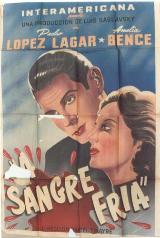
A sangre fría is a 1947 Argentine murder thriller film directed by Daniel Tinayre and written by Luis Saslavsky.
Ambición is a 1939 Argentine film of the Golden Age of Argentine cinema directed by Adelqui Migliar and written by José B. Cairola. The film starred Floren Delbene and Fanny Navarro. It was the first film of Armando Bo.

Amalia is a 1936 Argentine film of the Golden Age of Argentine cinema directed by Luis Moglia Barth. Barth also wrote the script based on the novel by José Mármol. The film is a remake of the 1914 film of the same name. The film starred Herminia Franco.
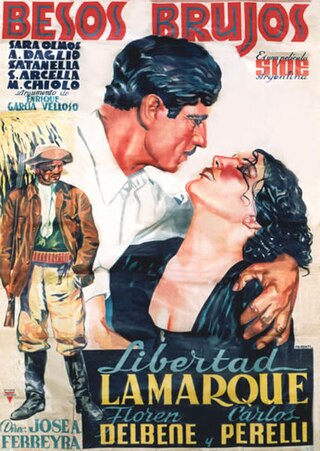
Bewitching Kisses is a 1937 Argentine romantic drama film musical of the Golden Age of Argentine cinema directed and written by José A. Ferreyra, based on a story by Enrique García Velloso. Starring Libertad Lamarque and Floren Delbene.

Floren Delbene was an Argentine film actor and writer of the Golden Age of Argentine Cinema.
Sara Barrié was a Chilean born Argentine film actress who appeared in the cinema of Argentina in the 1940s. She appeared in films such as Un Atardecer de amor in 1943 working with actors such as Floren Delbene and Ana Arneodo.
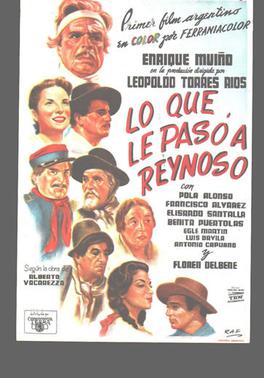
Lo que le pasó a Reynoso is a 1937 Argentine drama film directed and written by Leopoldo Torres Ríos during the Golden Age of Argentine cinema. The film was based on a play by Alberto Vaccarezza and premiered in Buenos Aires on February 18, 1937. It starred Floren Delbene.
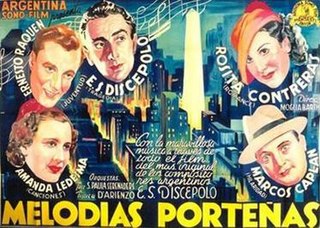
Melodías porteñas is a 1937 Argentine film, a musical directed by Luis Moglia Barth, who also co-wrote it. It is one of the most iconic films of the Golden Age of Argentine cinema. It is based on a struggling radio station, and depicts the events leading up to and following the disappearance of the station's star tango singer, played by Amanda Ledesma. It may be seen as an exposé of the sensationalism of radio stations of the period. Enrique Santos Discépolo won praise for his performance as the increasingly desperate director of the station.
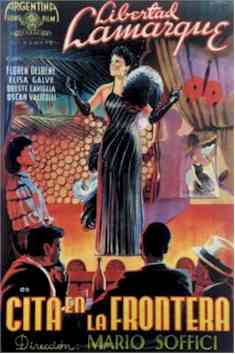
Cita en la frontera is a 1940 Argentine film of the Golden Age of Argentine cinema directed by Mario Soffici and starring Libertad Lamarque.

The Age of Love is a 1954 Argentine musical comedy film directed by Julio Saraceni and starring Lolita Torres, Alberto Dalbés and Floren Delbene.

La senda oscura is a 1947 Argentine film, directed by Luis Moglia Barth and starring María Duval, Elsa O'Connor and Ricardo Passano.

The Englishman of the Bones is a 1940 Argentine melodrama film of the Golden Age of Argentine cinema directed and written by Carlos Hugo Christensen, based on a novel of the same name by Benito Lynch.
The Tango Star is a 1940 Argentine musical film of the Golden Age of Argentine cinema directed by Luis Bayón Herrera and starring Hugo del Carril, Amanda Ledesma and Berta Aliana. A tango star enjoys a relationship with a young woman from a wealthy family.
Juan Moreira is a 1948 Argentine historical action film directed by Luis Moglia Barth and starring Floren Delbene, Dorita Ferreyro and Nedda Francy. The film is an adaptation of the 1879 novel Juan Moreira by Eduardo Gutiérrez, portraying the life of the nineteenth century guacho and outlaw Juan Moreira.
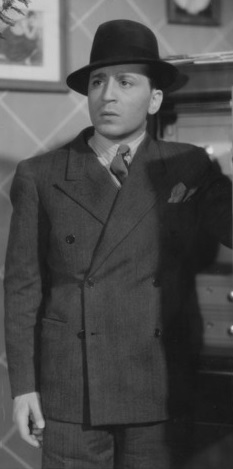
Pedro Maratea was an Argentine film actor.
Dancing is a 1933 Argentine musical film directed by Luis Moglia Barth for Argentina Sono Film. The film's sets were designed by the art director Juan Manuel Concado. It is based on a play by Alejandro Berrutti. It was the second ever sound film to be released by the studio after Barth's ¡Tango!, which inaugurated the classical-industrial period of Argentine cinema. It marked the debut of Amelia Bence, who had a minor role.
The Three Rats is a 1946 Argentine drama film directed by Carlos Schlieper and starring Mecha Ortiz, Amelia Bence and María Duval. It is an adaptation of Alfredo Pareja Diezcanseco's 1944 novel of the same title.
Mother Gloria is a 1941 Argentine comedy film of the Golden Age of Argentine cinema, directed by Richard Harlan and starring Olinda Bozán, Aída Luz and Pedro Maratea.
Santos Vega is a 1936 Argentine historical film directed by Luis Moglia Barth during the Golden Age of Argentine cinema. It is based on the story of Santos Vega.

María Padín was a Uruguayan film, radio, and theater actress and producer who had a successful career in Argentina.
References
- ↑ Rist p.74